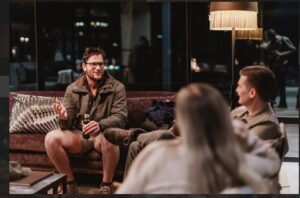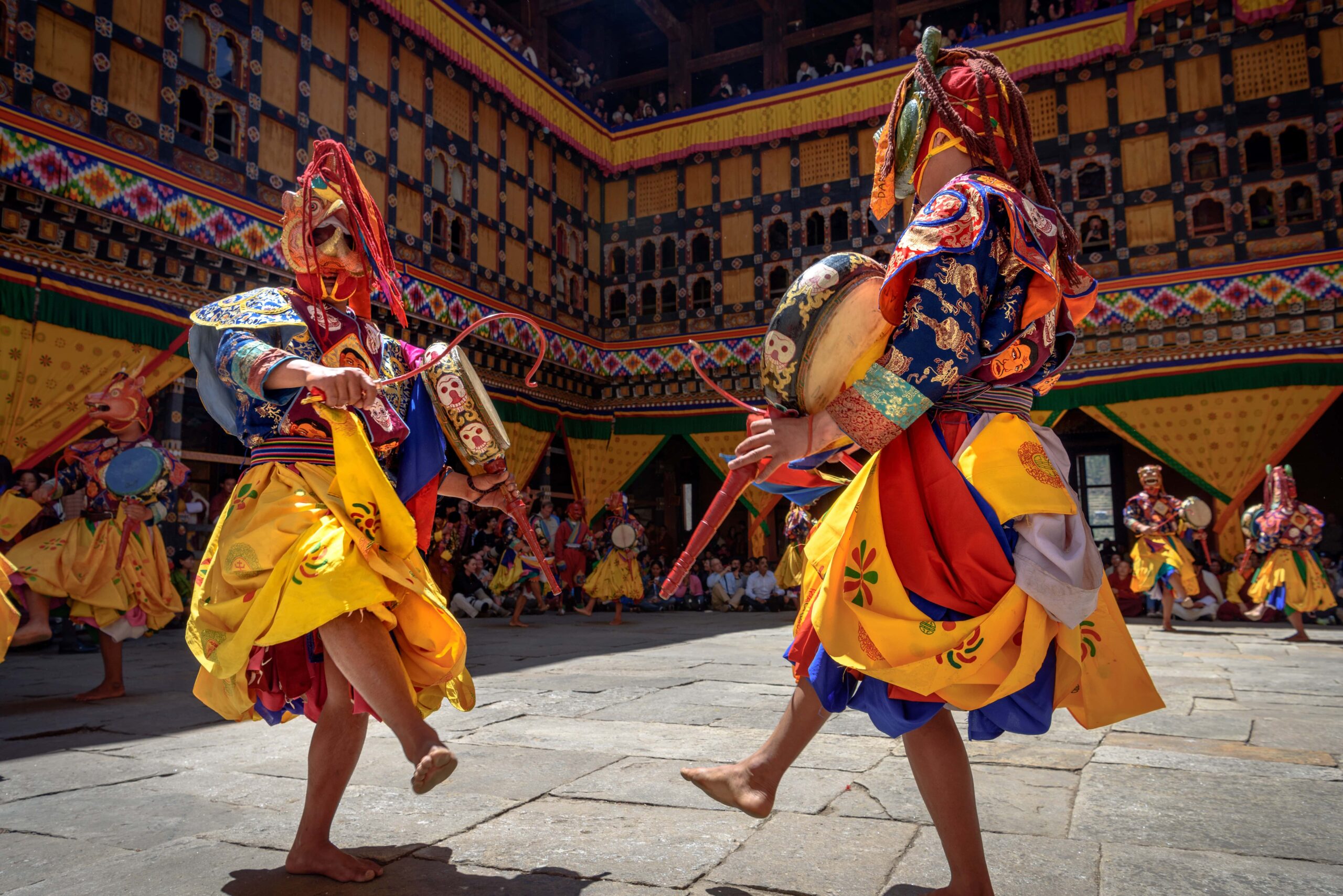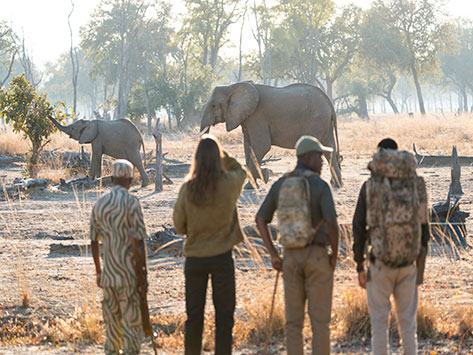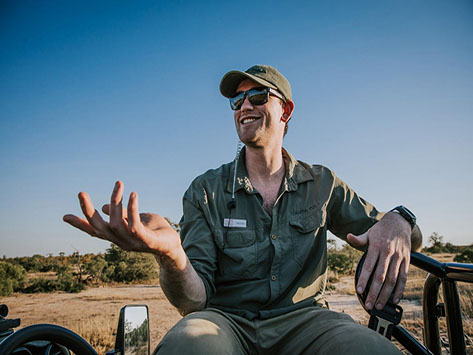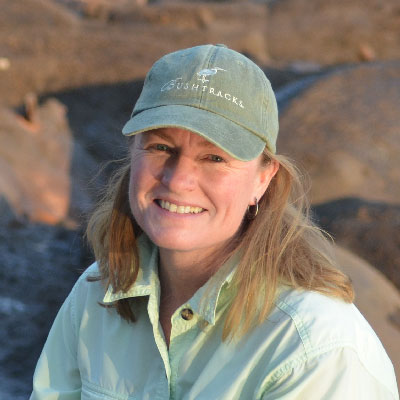Guides are the Heart of Safari: Why the Right Guide Changes Everything
![]()
African safari guides sit between wilderness and traveler. They are the storytellers who transform a sighting into a story, the anthropologists who connect landscapes with people, and the conservationists who make each drive part of a much larger narrative.
Unlike any field manual or documentary, a skilled guide brings together science, culture, and lived experience. In a single outing, they might interpret the alarm call of a bird through the lens of ecology, explain the medicinal use of a plant through local tradition, and recount a historical event that shaped the land. In their hands, the African bush becomes more than scenery — it becomes a living, layered classroom.
The Disciplines of Guiding
Great guiding is multidisciplinary. It combines:
- Natural Science — ecology, geology, animal behavior, and conservation biology.
- Cultural Knowledge — traditions, stories, and practices of communities who have lived alongside wildlife for centuries.
- Anthropology & History — the human dimension of the landscape, from ancient migration routes to today’s conservation challenges.
- Storytelling — weaving science and culture into narratives that resonate emotionally and intellectually.
Across Africa, professional guiding is considered one of the most respected careers. In countries like South Africa, Zimbabwe, Kenya, and Botswana, qualifications can require years of training, from mastering botany and ornithology to field safety and conservation law.¹
Profiles in Guiding
Tristan Allan-Reynolds, Timbavati Private Nature Reserve (South Africa)
Raised between city life in Durban and his family’s reserve in KwaZulu-Natal, Tristan Allan-Reynolds has always chosen the bush. Today, with six years of guiding experience — much of it on foot in remote corners of Kruger — he guides at Tanda Tula in the Timbavati, where his safaris are as much about meaning as they are about wildlife.
Tristan began in conservation, helping with anti-poaching work and caring for orphaned rhinos. That foundation shaped his approach: a safari is not just about seeing lions or elephants, but about understanding the delicate balance of ecosystems and the role each visitor plays in protecting them.
As he explains: “I try to balance bucket-list moments with helping people understand how an ecosystem works. The bush is more than big cats, it’s about conservation and connection. Guests are contributing just by being here, and once they understand that, it adds meaning to the whole experience.”
His work extends beyond the vehicle. With his podcast Heart of the Wild, co-hosted with Dianna, he shares stories from the field and spotlights conservation organizations, bringing safari perspectives to a wider audience.
Earlier this year, Bushtracks’ Hands-On South Africa expedition was led by Tristan in the Timbavati, where his ability to connect wildlife, landscapes, and people enriched every moment in the bush. And travelers on our 2026 Hands-On South Africa may just have the pleasure of meeting him. 🎧 Listen to Tristan’s Podcast: Heart of the Wild on Apple Podcasts — stories from the field and conversations about conservation.
Bellamy Noko, Mashatu Game Reserve (Botswana)
![]()
For Bellamy Noko at Mashatu Game Reserve in Botswana, guiding is not just a profession — it is part of his heritage. Born on the very land where he now leads safaris, he brings guests into a world he has known since childhood.
Bellamy is celebrated for his ability to weave together ecological knowledge, cultural insight, and lived experience. He explains how landscapes shape wildlife, how traditions connect people to the bush, and how conservation secures a future for both.
At his side is his younger brother, serving as tracker. Watching them together is to witness knowledge passed down between generations. One day, his brother will step into Bellamy’s shoes, carrying forward not only the skills of the trade but also the legacy of place.
On the June departure of Bushtracks’ Safari Legends journey, guests were guided by Bellamy at Mashatu. His storytelling and heritage-based approach brought the open landscapes of Botswana vividly to life.
Mike Moth, MalaMala Game Reserve (South Africa)
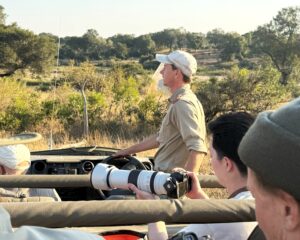
At MalaMala Game Reserve in South Africa, one of the country’s most storied safari landscapes, guests are often guided by Mike Moth, a respected figure in the field.
Mike is known for his calm presence and uncanny ability to track wildlife through challenging terrain. Guests describe his style as patient and thoughtful. He doesn’t just point out animals — he explains the web of signs that led him there.
To watch Mike in action is to glimpse the depth of guiding as a profession. He can interpret a faint mark in the sand, read the alarm calls of birds, or predict the path of a leopard through its territory. Every moment becomes a lesson in how humans and wildlife are connected through observation and respect.
On that same June Safari Legends departure, guests at MalaMala were guided by Mike, whose expertise in tracking and interpretation added depth to one of South Africa’s most iconic reserves.
A New Chapter: Women in Guiding
For decades, guiding was a male-dominated profession. But across Africa, women are stepping into the role, bringing new perspectives and expanding the definition of who a safari guide can be.
In Botswana’s Chobe National Park, the Chobe Angels became the first all-female guiding team in Africa, breaking barriers and inspiring a new generation.² In Tanzania’s Serengeti, Dunia Camp, operated entirely by women, has become a model for empowerment and excellence in guiding.³ Training programs across the continent are now actively encouraging women to join, providing mentorship and scholarships to widen the field.
The impact is significant. Female guides are not only excelling in the field, but also reshaping guest experiences by bringing in perspectives on community, family, and conservation that enrich the safari narrative.
Why It Matters
The right guide does more than find animals. They safeguard fragile ecosystems by managing how guests move through the bush, ensuring vehicles don’t crowd sightings or disrupt migrations. They serve as conservation educators, explaining both the triumphs and challenges facing Africa’s wildlife. And perhaps most importantly, they remind travelers that Africa is not just a wilderness to be observed, but a living, cultural landscape to be respected.
The Takeaway
A safari without a skilled guide is a tour. A safari with one is a story. And like the best stories, the ones told in Africa’s wild places are meant to stay with you long after the dust has settled.
References:
- FGASA (Field Guides Association of Southern Africa), Kenya Professional Safari Guides Association, and Zimbabwe’s *Professional Guides License are considered the most rigorous guiding qualifications.
- Chobe Angels: widely documented as the first all-female guiding team in Africa. Featured in BBC, Vogue, and National Geographic.
- Dunia Camp: Serengeti camp run entirely by women, operated by Asilia Africa; highlighted in Condé Nast Traveler, Travel Weekly, and others.



